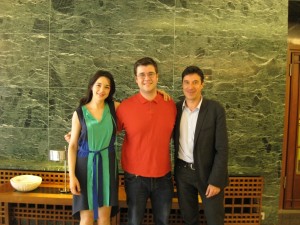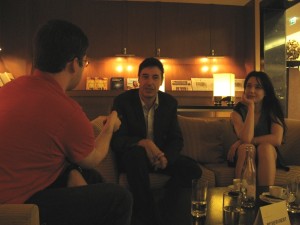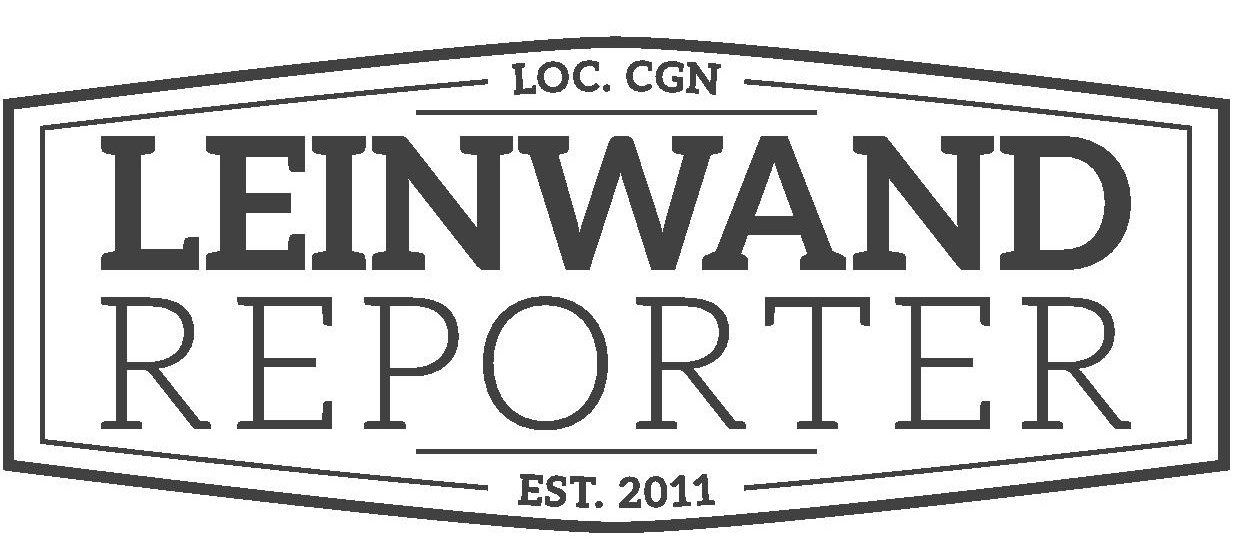
Myriam Tekaia, Thomas Trierweiler und Sylvain Estibal (Bild: Marc Thomas)
Sylvain Estibal ist ein französischer Filmemacher und Journalist. Nachdem er ein Fotoprojekt über die kulturellen Unterschiede am Gaza-Streifen gemacht hatte, wollte er zu dem Thema einen Film drehen. Er schrieb das Drehbuch zu „Das Schwein von Gaza“ (zur Rezension) und fand mit StudioCanal einen Verleih, der den Film vertreiben wollte (in Deutschland übernahm Alamode Film den Vertrieb) und ihm die Chance gab, bei dem Film Regie zu führen. 2012 gewann er den César-Award für den „Best First Film“. Privat ist er mit der Schaupielerin Myriam Tekaïa verheiratet, die im Film Yelena spielt, und lebt in Uruguay. Thomas Trierweiler sprach mit ihm über Gedanken hinter dem Film, lustige Anekdoten und seine persönlichen Vorstellungen für die Zukunft.
LWR: Wie sind Sie auf die Idee zu „Das Schwein von Gaza“ gekommen?
Sylvain Estibal: Mir wurde das Schwein vom Himmel geschickt. Während eines Trips nach Brasilien, saß ich in meinem Hotelzimmer und langweilte mich, weil es regnete war. Plötzlich schoss mir die Idee von einem Schwein als Verbindung zwischen der jüdischen und der arabischen Kommune Israels in den Kopf, da beide Gruppen dieses Tier verabscheuen. Ich dachte mir, dass es lustig wäre, eine Komödie über die Ankunft eines „bösen“ Tieres zu drehen. Nach den Erfahrungen, die ich im Land gemacht hatte (Anm.d. Red. Als Journalist und Fotokünstler) und der Mitarbeit von Myriam (Anm.d. Red. Tekaia), die sich sehr für dieses Projekt eingesetzt hat und viel mit mir diskutierte, dachte ich, dass wir für den Film diesen lustigen Aufschrei der Wut benötigen. Eine weiße Taube ist in dieser schlimmen Situation etwas zu offensichtlich. Da wurde mir klar: Wir brauchen ein großes, schwarzes Schwein.

Thomas Trierweiler im Interview mit Sylvain Estibal (Bild: Marc Thomas)
LWR: Was denken Sie über die Situation, mit der Ihre Hauptfigur Jaffar am Gaza-Streifen klarkommen muss?
Sylvain Estibal: Jaffar ist nur ein normaler Typ. Er ist wie du und ich. Er muss sich immer mit dem Problem auseinandersetzen, genug zum Überleben zu verdienen. Weil er so arm ist, muss er das Schwein einfach ausnutzen. Für ihn ist das Schwein ein Zeichen von Gott, dass dieser bereit ist, ihm zu helfen. Es ist das Schicksal eines menschlichen Wesens, immer besser sein zu wollen. In seiner Situation ist das ganze halt etwas komplizierter und das Schwein ist noch ein zusätzliches Problem, mit dem er klarkommen muss. Wir wollten keinen politischen Film machen. Wir wollten ihn auf der Höhe dieses Durchschnittstypen halten. Er ist auch nicht blöd. Er ist clever auf seine eigene Art, muss sich aber mit einem Problem auseinandersetzen, was größer ist, als alles andere was er bislang zu bewältigen hatte. Ich denke, dass sich viele Menschen auf der Welt mit seiner generellen Situation identifizieren können.
LWR: Haben Sie von Leuten, die in der Regionen leben oder gelebt haben, Reaktionen auf den Film bekommen?
Sylvain Estibal: Wir haben eine Menge Reaktionen von beiden Gruppen und von den Leuten aus Gaza, die unseren Film synchronisiert haben, bekommen. Bis jetzt waren die Reaktionen sehr positiv. Vor dem ersten Screening hatten wir ein bisschen Sorge, wie die Leute den Film aufnehmen würden. Deswegen sind wir sehr glücklich über das gute Feedback des Publikums. Leider wird der Film nicht in Israel gezeigt, wir hoffen aber, dass sich das in der Zukunft noch ändern wird. Eine palästinensische Organisation macht eine Tour mit dem Film und veranstaltet nach jeder Vorführung Debatten. Ich habe gehört, dass Teile der jüdischen Gemeinde auch an diesen Event-Vorführungen teilnehmen. Mein größter Erfolg ist es, dass ich eine Aussage in den Film eingebunden habe, mit der beide Seiten zufrieden sind. Der Humor hilft sehr dabei, die Message zu übermitteln, auch wenn ich von einigen Leuten für diese Herangehensweise kritisiert wurde.
LWR: Es gibt viele Filme über den Nahost-Konflikt. Was macht „Das Schwein von Gaza“ Ihrer Meinung nach zu einem besonderen?
Sylvain Estibal: Er ist der beste (lacht). Nein, das kann ich natürlich nicht sagen . Es ist eine Vision von außerhalb. Es ist eine Art humoristisches Märchen. Ich denke nicht, dass es viele Komödien über die Absurdität dieses Konfliktes gibt. Ich wollte eine Komödie über etwas sehr Trauriges machen. Ich denke, das könnte interessant und hilfreich für Leute sein, die mehr über den Konflikt erfahren wollen. Es ist unser eigener Mix eines realistischen Kerns mit surrealistischen Elementen.
LWR: Sie haben sehr viele Szenen und Köln gedreht und mit der Filmstiftung NRW zusammengearbeitet. Wie kam es dazu, dass Sie hier gedreht haben?
Sylvain Estibal: Das deutsche Unternehmen Barry Film hat den Film mitfinanziert und wir haben ein deutsches Team für das Szenenbild engagiert. Wir arbeiteten mit Albrecht Konrad, einem großartigen Szenenbildner (Anm. d:Red. 2003 bekam er den Emmy Award für Bestes Szenenbild in „Hitler – The Rise of the Evil“). Vor zwei Jahren arbeitete er noch mit Roman Polanski an „Der Ghostwriter“ und machte mit seinem Team einen großartigen Job. In unserem Film machte er alle Designs in Malta und für die Innendrehs, die komplett in Köln gedreht wurden. Da es mein erster Film war, bin ich natürlich sehr glücklich darüber gewesen mit einem Profi wie ihm zu arbeiten. Dank ihm und seinem Team war der Dreh in Köln sehr einfach. Jeder war gut vorbereitet für die Studiodrehs In Malta war es komplizierter, da wir draußen drehen mussten und unsere Probleme mit dem Wetter hatten.

Das Schwein von Gaza Titelbild (Quelle: Alamode Film)
LWR: Können Sie uns eine lustige Anekdote aus ihrer Zeit in Köln erzählen?
Sylvain Estibal: Ich kann. Ich weiß nicht ob es ein Zeichen von Gott war, aber uns ist etwas wirklich Kurioses passiert, als wir einen Sonntag frei hatten. Wir wollten uns Schloss Drachenburg in Königswinter angucken, das als Inspiration für Walt Disney gedient hatte. Wir haben unseren Zug den Hügel hoch (Anm. d. Red.: Drachenfels) zum Schloss verpasst und hatten 30 Minuten, die wir rumkriegen mussten. Deswegen sind wir auf einen Markt gegangen. Ich habe nichts gesucht und bin nur ein bisschen herumgewandert. Plötzlich habe ich runter auf einen Tisch geguckt und ein goldenes Schwein mit Flügeln gesehen. Ich habe in die Hand genommen und die Verkäuferin gefragt, wie teuer es ist. Sie sagte mir: „Einen Euro – Es ist sehr hässlich, aber auch sehr nett“ Tdas war ein Dialog aus dem Film. Ich konnte es einfach nicht glauben.Sie verkaufte mir das Schwein. Danach machten wir ein Foto von dem ganzen Team mit dem goldenen Schwein. Das war unser erster Award und der Dreh war noch nicht einmal beendet. (lacht) Monate später gewannen wir dann den César Award. Was für eine unglaubliche Erfahrung.
LWR: Sie haben lange Zeit als Journalist gearbeitet und jetzt ihr César Award-gekröntes Regiedebüt mit „Das Schwein von Gaza“ gegeben. Wo sehen Sie ihre persönliche Zukunft?
Sylvain Estibal: Momentan in beiden Berufen. Ich glaube, jeder Job stützt den anderen. Vielleicht ändert sich etwas, wenn ich meinen zweiten Film gedreht habe, den das Publikum mag. Aber für mich persönlich nimmt das Arbeiten in beiden Berufen den unbedingten Erfolgsdruck etwas weg. Mir geht es hauptsächlich darum, Leute zu treffen mit denen ich meine Gedanken austauschen kann. Wir werden sehen, wie es endet.

Sylvain Estibal beantwortet Fragen von Leinwandreporter Thomas (Bild: Marc Thomas)
Englisches Original
Sylvain Estibal is a French film maker and journalist. After he did a photo project about the cultural differences in Gaza, he wanted to make a movie about it. He wrote the script for „When Pigs have Wings“, and won StudioCanal as distributor (in Germany: Alamode Film) who also gave him the opportunity to direct the movie. In 2012 he won the César-Award for „Best First Film“. In private he is married to the actress Myriam Tekaïa, who played Yelena in the movie and lives in Uruguay.Thomas Trierweiler talked to him about ideas behind the movie, funny anecdotes and his personal future.
LWR: How did you come up with your idea for “When Pigs Have Wings“?
Sylvain Estibal: I received a pig from the sky. During a trip to Brazil I was in my hotel room and I was bored because it was raining outside. Suddenly I came up with the idea of a pig as the link between the Jewish and the Arabic community because they reject the same animal. I thought it would be funny to have a comedy speaking about the conflict with the arrival of a „bad“ animal. After the experiences of what I have done before (Editor’s note: as a journalist in the region) and the colloboration of Miriam (Editor’s note: Tekaia) who was really involved in the project and talked with me a lot about the conflict, I thought it would be great to have a funny shout of anger. That the white dove is not enough know in that bad situation is obvious. So I knew: We need a big black pig.
LWR: What do you think about the situation your lead character Jaffar has to live with at the Gaza Stripe?
Sylvain Estibal: Jaffar is just a common guy. He is you and me. He has to face a huge problem in earning enough to make his living. So he has to benefit from the pig because he is so poor. For him, finding the animal is a sign of God, that he is willing to help him. It is the destiny of a human being to try to get better. In his case it is maybe a little more complicated and the pig is another complication he has to deal with. We did not want to make a political movie. We wanted it to be on the level of the common guy. He isn’t stupid, he is clever in his own way but he has to deal with a problem which is bigger than anything he dealt with before. I think many people in the world can identify with his situation in general.
LWR: Did you get reactions on your movie from people who are living in the region or lived?
Sylvain Estibal: We got many reactions of both communities and from people who participated in the voicing and live in the Gaza region. For the moment the reactions are very positive. Before we started the screenings we were a bit concerned about the reactions to come, so we are happy about the good feedback the audience gave us. Unfortunately the movie isn’t distibuted in Israel for now, but we would like to see it happen in the future. A palestinian organization in France is doing a tour with our movie with a debate after every screening. I heard that parts of the jewish community also participate in these event screenings. My major success is that I found a position that can be accepted by both sides. The humour helps a lot to receive the message even if some people criticize the way I dealt with this topic.

Sylvain Estibal signiert ein Plakat (Bild: Marc Thomas)
LWR: There are many movies about the Middle East conflict. What makes „When Pigs Have Wings“ special in your opinion?
Sylvain Estibal: It is the best one (laughing). No, I don’t know about that. It is a vision from outside. It is kind of a humouristic fairytale. I don’t think there is many comedy about the absurdity of the conflict. I wanted to make a comedy about something really sad. I thought it could be interesting and helpful for the people, who want to know more about the conflict. It is our mix from a realistic core with surrealistic elements.
LWR: You shot many scenes of the movie in Cologne and you collaborated with the Filmstiftung NRW. How did it come up for you that you worked here?
Sylvain Estibal: The German company Barry Film was in the founding and we hired a German team for the art department. We had Albrecht Konrad, who is a very great production designer (Editor’s note: 2003 Emmy Award for Outstanding Art Direction in “Hitler – The Rise of the Evil”). Just two years ago he worked with Roman Polanski on “The Ghostwriter“ and he did an amazing job with his team. In our movie he did all the art work in Malta and for the interior scenes, which were completely shot in Cologne. As it was my first movie, I was happy to work with a professional like him. Thanks to them the shooting in Cologne was very easy. Everybody was well prepared for the studiowork. In Malta it was more complicated, because we had to shoot outside and had our issues with the weather.
LWR: Do you have a funny anecdote from your time in Cologne?
Sylvain Estibal: I have. I don’t know if it was a sign of God but something curious happened when we had a Sunday off. We went to see the castle Schloss Drachenburg in Königswinter, which was an inspiration for Walt Disney. We missed our train to go up the hill (editor’s note: Drachenfels) to the castle and we had 30 minutes to spend. So we decided to go to a market. I wasn’t looking for anything and just walked around. Suddenly I looked down on one table and saw a golden pig with wings. I took it up and asked the woman on the stand how much it is. She told me: “One Euro – it is very ugly, but very nice.“ That was one dialogue in the movie. I couldn’t believe it. So she sold me the pig. After that we took a picture. The whole team with the golden pig. It was our first award and the shooting wasn’t even finished. (laughing) Months later we won the César Award. What an incredible experience.
LWR: You worked as a journalist for a long time and had your César Award winning debut as a director with „When Pigs Have Wings“. Where do you see your personal future?
Sylvain Estibal: For the moment in both carreers. I think each job helps the other one. Maybe something will change when I shoot a second movie and people like it. For me personally working in both jobs takes away success pressure. And the main thing for me is to meet people I can share my thoughts with. We will find out where it ends.

